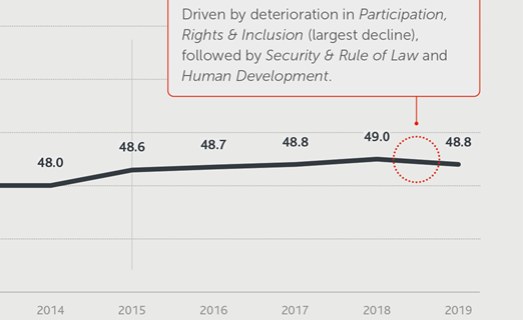
[ad_1]
The 2020 Ibrahim Index of African Governance (IIAG), launched today by the Mo Ibrahim Foundation, highlights for the first time since 2010 a decline in African governance performance.
The first decline in governance performance since 2010
The 2019 African average global governance score falls -0.2 points below that of 2018, the first year-on-year deterioration of the score since 2010. This recent decline is triggered by worsening performance in three of the four IIAG categories: Participation, Rights & Inclusion, Security and Rule of Law and Human Development.
Indeed, progress had already slowed since 2015. Over the course of 2015-2019, performance slowed in both human development and the basis for economic opportunity, while the deterioration in both security and the rule of law and participation continued. , rights and inclusion, the latter.
However, over the decade, overall governance performance has slightly improved and in 2019 61.2% of the African population lives in a country where overall governance is better than in 2010.
The IIAG 2020 is the most comprehensive assessment of governance performance in 54 African countries. It tracks Africa’s trajectory through four main categories: Security and the rule of law; Participation, rights and inclusion; Fundamentals for Economic Opportunities; and human development. The new IIAG incorporates three significant improvements: an expanded governance scope, including new areas such as the environment and equality; strengthened indicators, thanks to better data availability; and a new section entirely dedicated to the voices of the citizens of Africa.
Over the past decade, the dimensions of governance have followed divergent paths
The progress made over the past decade has been primarily driven by improved economic opportunities and human development. The foundations for economic opportunity (+4.1) and human development (+3.0) have made good progress, driven mainly by improvements in the Infrastructure and Health sub-categories, complemented by progress in the sustainable environment.
This is threatened, however, by an increasingly precarious security situation and concerning the erosion of rights and of civic and democratic space. Over the past decade, both Participation, Rights & Inclusion (-1.4) and Security & Rule of Law (-0.7) have recorded worrying decreases.
Over the past decade, 20 countries, which are home to 41.9% of the African population, while making progress in human development and the foundations for economic opportunity, have declined both in security and the rule of law and in participation, rights at the same time. and inclusion.
Only eight countries manage to improve in all four categories over the decade: Angola, Chad, Ivory Coast, Ethiopia, Madagascar, Seychelles, Sudan and Togo.
COVID-19 increases existing challenges and threatens economic progress
The 2020 IIAG provides a picture of the continent before it was hit by COVID-19. In terms of participation, rights and inclusion, progress was slowing long before the pandemic, which only worsens the existing negative trajectory. Conversely, the economic opportunity has been set on a positive course of sustained progress, and the impact of COVID-19 is now threatening this hard-won achievement.
African citizens are increasingly dissatisfied with the provision of governance in their countries
In 2019, a new analysis from the Citizens’ Voices section of the IIAG reveals that public perception of overall governance scores the lowest in the decade, with the pace of deterioration nearly doubling over the past five years.
A balanced approach to governance is crucial for progress, as well as for improving the rule of law, justice, inclusion and equality
The strongest correlations between global governance performance are found with the sub-categories Rule of Law and Justice and Inclusion and Equality. Indicators showing the strongest relationships with high overall governance scores span all four IIAG categories, underlining the importance of a balanced approach to governance.
The growing imbalance between the various dimensions of governance outlined above risks threatening the overall performance of governance.
Mo Ibrahim, president of the Mo Ibrahim Foundation, says: “This is a testing period for Africa. The pre-existing weaknesses and challenges in African governance, as discovered by the IIAG 2020, are exacerbated by COVID-19, which also threatens economic progress. Citizens’ dissatisfaction and distrust of governance is increasing. African states have the opportunity to demonstrate both their determination to safeguard democracy and their ability to lead a new growth model that is more resilient, fairer, more sustainable and more self-sufficient. “
.
[ad_2]
Source link
